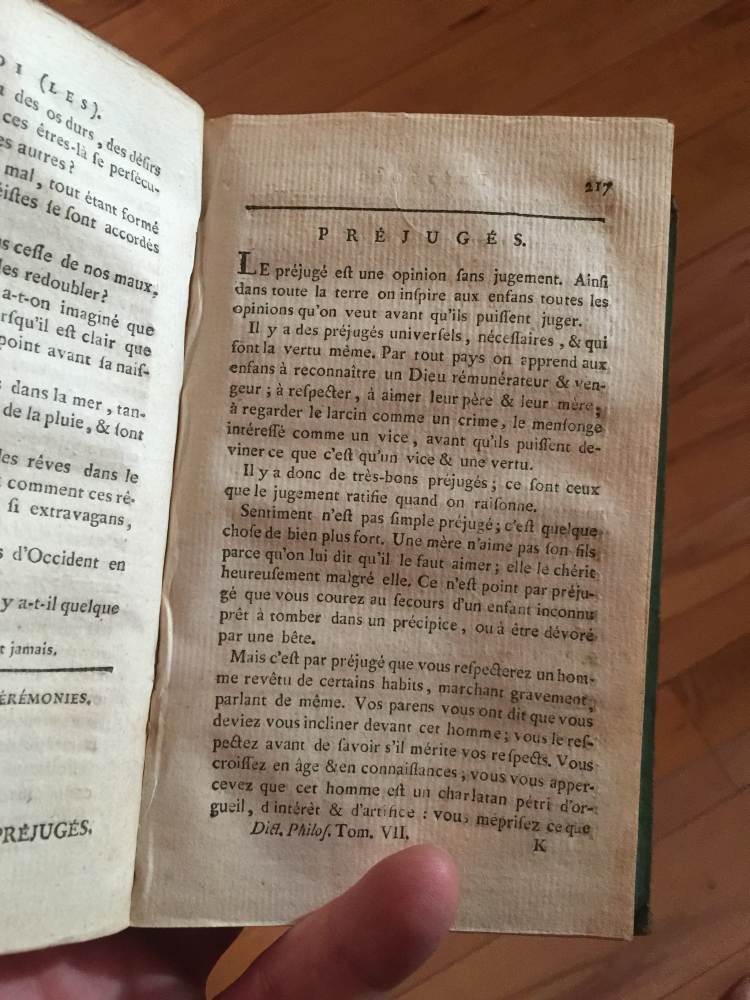
Voltaire by Houdon
Prejudice is an opinion without judgement. Thus all over Earth we inspire in children all the opinions we want before they become able to judge them.

Voltaire on Prejudice
There are universal prejudices, that are necessary, from which are formed the virtues. In every country we teach children to recognize a god that rewards and punishes, to respect and love one’s father and mother, to regard theft as a crime, lying for one’s advantage as a vice, before they are capable of determining on their own what is vice and what is virtue.

Voltaire is right – we learn our prejudices in our childhoods, and those prejudices are adopted as they come from authority. That’s probably why it’s so hard to overcome the simpler prejudices like racism and sexism: they’re embedded in a person’s world-view as foundational knowledge, even though that knowledge may be entirely unfounded.

Yeah, childhood enculturation — more pernicious than (but different to) deliberate childhood inculcation.
John Morales@#1:
Yeah, childhood enculturation — more pernicious than (but different to) deliberate childhood inculcation.
I sometimes wonder if there’s much difference. “Give me the boy, and I’ll give you the man” or whatever it was Loyola said.
In the case of US society we see it as that there are people who grow up and absorb the idea that one skin color is inferior – the kids breathe it in, because of existing inequality that’s how it appears to be.
Marcus, as I see it, the difference is deliberateness and purpose. Enculturation is impossible to avoid, inculcation follows an agenda and is to some degree discretionary.
Did Voltaire ever get so meta about his own anti-Semitism?
Pierce R. Butler@#4:
Did Voltaire ever get so meta about his own anti-Semitism?
Nope. He absorbed that particular poison early on and was never able to get it out of his system.
Now that you mention it, maybe I’ll do his encyclopedia entry on “jews” next. It’s pretty bad.
Marcus Ranum @ # 5: He absorbed that particular poison early on …
Sad/odd that he didn’t/couldn’t identify it as part of the Catholicism he otherwise (? – maybe I missed something) purged from his brain.
Pierce R. Butler@#6:
Aha! I think you missed something.
Voltaire was not an atheist. He was anti-clerical and – during his “ecrasez l’infame!” period – extremely vocal about it, but he didn’t reject religion entirely. I guess the best way to access him would be to think of him as the prototypical “I’m not religious but I believe in god; I reject all the churches and man-made fol-de-rol of religion”
Since Voltaire appeared to believe that at least some of the bible was true, he appears to have accepted that some of the horrible things the bible said about the jews was also true. For that matter, he seems to have accepted that some of the horrible things the jews say about themselves was true. I’m working from memory, here, but I recall him writing somewhere that the jews had it pretty tough even though they were god’s chosen people. That sort of thing. And with Voltaire it’s very very hard to tell when he’s being completely serious.
Peter Gay’s “Voltaire’s Politics” is a great book about Voltaire’s politics; I need to pull my copy off the shelf and maybe next friday’s Voltaire I can talk about his antisemitism. It’s a good thing not to let him off the hook about that. No heros!
Marcus Ranum @ # 7: Aha! I think you missed something.;
Happens all the time – did you miss that?
He was anti-clerical and … extremely vocal about it, but he didn’t reject religion entirely.
Atheism pre-Darwin required a helluva leap; I fully understand why careful thinkers felt reluctant to take that.
Voltaire appeared to believe that at least some of the bible was true…
His “Jews” write-up seems to take the OT quite literally. Maybe I missed something (else), but that looks like a serious lapse in skepticism/rationality there (though, again, V wrote in the century before any seriously scholarly critiques came out).
Peter Gay’s “Voltaire’s Politics” …
Added to my “look for” list – thanks!
Pierce R. Butler@#8:
did you miss that?
I miss stuff all the time, so yeah, I probably did.
His “Jews” write-up seems to take the OT quite literally. Maybe I missed something (else), but that looks like a serious lapse in skepticism/rationality there (though, again, V wrote in the century before any seriously scholarly critiques came out).
Yes. In some other piece of his I read something about how much he wanted to visit the holy land some day and see for himself. It was odd for me to realize that someone from his period only had 2nd hand accounts and paintings to go by – one of us would be able to google “Megiddo” and see pictures instantly. The early enlightenment thinkers were dealing with information that was heavily decorated with exaggerations and outright lies (i.e.: the biblical account) so we can understand why they might take some things at face value that we’d reject now that we’re more sophisticated.
I am puzzled that his skepticism seemed to privilege certain targets. It’s not out of the question that even the great Voltaire would find some places just too painful to probe.